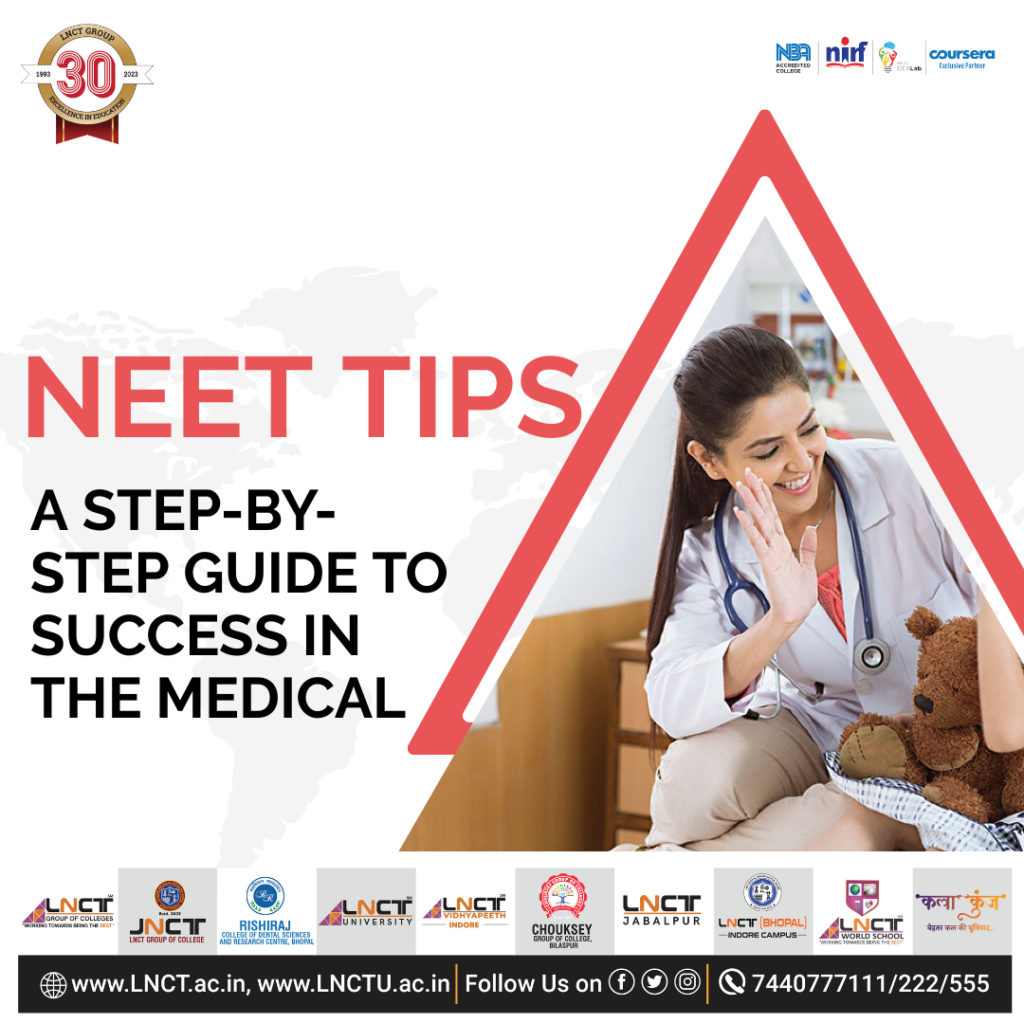Preparing for NEET (National Eligibility cum Entrance Test) or AIIMS (All India Institute of Medical Sciences)
Step-by-step guide
Preparing for NEET (National Eligibility cum Entrance Test) or AIIMS (All India Institute of Medical Sciences) requires dedication, strategic planning, and effective study techniques. Here is a step-by-step guide to help you succeed in these competitive medical entrance exams:
Step 1: Understand the Syllabus and Exam Pattern
Familiarize yourself with the NEET/AIIMS syllabus, which includes subjects like Physics, Chemistry, Biology (Botany and Zoology), and sometimes General Knowledge.
Analyze the exam pattern, including the number of questions, marking scheme, and time duration.
Step 2: Create a Study Schedule
Develop a well-structured study plan that covers the entire syllabus and allows sufficient time for revision.
Allocate specific time slots for each subject and prioritize topics based on their weightage in the exam.
Step 3: Gather Study Resources
Collect relevant study materials, including textbooks, reference books, online resources, and previous years’ question papers.
Consider investing in reputable NEET/AIIMS preparation books and online courses for comprehensive coverage.
Step 4: Learn Concepts and Fundamentals
Start with understanding the basic concepts of each subject.
Take notes, make flashcards, and use mnemonic techniques to aid memorization.
Practice numerical problems and equations to strengthen your problem-solving skills.
Step 5: Practice Regularly
Solve a wide range of practice questions, sample papers, and mock tests.
Time yourself while attempting practice tests to improve speed and accuracy.
Analyze your performance, identify weak areas, and work on improving them.
Step 6: Seek Clarification
Don’t hesitate to seek help from teachers, mentors, or online communities if you encounter difficulties understanding certain topics.
Join study groups or online forums to discuss concepts and share study resources with fellow aspirants.
Step 7: Revise and Review
Regularly revise the topics you have covered to reinforce your learning.
Focus on weak areas and frequently asked topics.
Create concise notes or mind maps to aid in quick revision before the exam.
Step 8: Stay Healthy and Manage Stress
Maintain a healthy lifestyle with a balanced diet, regular exercise, and adequate sleep.
Practice relaxation techniques such as meditation or deep breathing to manage exam-related stress and anxiety.
Step 9: Stay Updated and Solve Previous Years’ Papers
Keep yourself updated with the latest news and developments in the medical field.
Solve previous years’ question papers to understand the exam pattern, identify recurring concepts, and practice time management.
Step 10: Mock Tests and Test Series
Take full-length mock tests and enroll in reputable test series to simulate the real exam environment.
Analyze your performance in mock tests, identify areas of improvement, and adjust your study plan accordingly.
Step 11: Stay Motivated and Believe in Yourself
Maintain a positive mindset, stay motivated, and believe in your abilities.
Surround yourself with supportive peers and mentors who encourage and inspire you throughout your preparation journey.
Remember, success in NEET/AIIMS requires consistent effort, discipline, and perseverance. Stay focused, maintain a balanced approach, and give your best effort while keeping a positive attitude. Good luck!
Unlock Your Career Potential: A Step-by-Step Guide to Building Your Future
- A Complete Step-by-Step Guide to Success in NEET/AIIMS
- A Complete Step-by-Step Guide to Successful Journalist/Reporter
Some Other Important Tips Suggested By Toppers
- Align your system according to the afternoon session of the exam. Schedule your day and study plan to be most active from 2 pm – 5 pm. Avoid sleeping during this window.
- Wear comfortable clothes on the day of the exam to ensure you are at ease.
- Use the washroom before entering the exam hall to avoid any distractions during the exam.
- When approaching a topic, read it fully, revise it a couple of times, and then move on to solving questions related to it.
- Set a timer while solving questions, even during preparation time, to improve your time management skills.
- During the NEET exam, start with the Biology section as it is a scoring subject. Dedicate around 45-50 minutes to solve this section. Chemistry is less time-consuming, so allocate around 35-40 minutes for it. Physics should preferably be attempted last due to its numerical nature, and it requires at least 90 minutes. Practice managing time for each section accordingly.
- Read the complete question before inputting the answer. It’s important not to miss out on any details and lose marks.
- Download sample OMR sheets available online and practice regularly to avoid errors while bubbling the answers.
- Avoid making silly mistakes such as not reading questions fully, missing out on options, bubbling the wrong circles, or overlooking questions.
- Focus on your preparation rather than constantly thinking about your rank. Concentrate on improving your knowledge and skills.
- Stick to NCERT books and your notes, and avoid relying on multiple sources that may confuse you.
- Solve a minimum of 20 previous years’ question papers to familiarize yourself with the exam pattern and types of questions asked.
- Minimize the use of social media as it can be a distraction from your studies.
- Take periodic breaks during your study sessions to relax and rejuvenate.
- Have confidence in yourself and your preparation. Avoid panicking and stay focused on performing your best.

Q1: How many hours a day should I study?
The number of hours you should study per day depends on various factors, including your individual learning style, study efficiency, and personal circumstances. While some NEET aspirants may dedicate 13-14 hours a day before their board exams, it’s important to find a study schedule that works best for you. Quality of study time is crucial, so focus on effective and focused study sessions rather than simply counting the hours. Remember to take breaks, maintain a balanced lifestyle, and prioritize your well-being alongside your studies.
Q2: What are the maximum marks ever scored at NEET?
NEET is conducted for a total of 720 marks, and the maximum marks ever scored in NEET is 720. In NEET 2020, there was a tie for the first position where two candidates achieved a perfect score of 720 marks. It’s a remarkable achievement to score the highest possible marks in NEET, but it’s important to note that your aim should be to do your best and achieve a score that helps you secure admission to a good medical college, rather than solely focusing on the highest score.
Q3: How can I effectively manage my time during the NEET exam?
A3: To effectively manage your time during the NEET exam, it is recommended to allocate specific time slots for each section—Biology, Chemistry, and Physics. Plan to spend around 45-50 minutes on Biology, 35-40 minutes on Chemistry, and at least 90 minutes on Physics. Practice time management during your preparation by solving mock tests and previous year papers within the given time limits.
Q4: Should I join a coaching institute for NEET preparation?
A4: Joining a coaching institute for NEET preparation can be beneficial, as it provides structured guidance, expert faculty, study materials, and a competitive environment. However, it is not mandatory to join a coaching institute. Many students have achieved success through self-study as well. Assess your learning style, resources, and personal preferences to make an informed decision about joining a coaching institute.
Q5: How can I improve my problem-solving skills for the NEET exam?
A5: To enhance your problem-solving skills for NEET, regular practice is essential. Solve a variety of practice questions, sample papers, and previous year papers. Analyze the solutions and understand the underlying concepts. Additionally, consider joining mock test series or online practice platforms to simulate the exam environment and improve your speed and accuracy in solving problems.
Q6: How important is revising NCERT books for NEET preparation?
A6: NCERT books are highly important for NEET preparation. They provide a strong foundation and cover the core concepts required for the exam. Most of the questions in NEET are based on the NCERT syllabus. Therefore, it is crucial to thoroughly study and revise the NCERT books for all three subjects: Biology, Chemistry, and Physics.
Q7: What is the role of mock tests in NEET preparation?
A7: Mock tests play a vital role in NEET preparation. They help you familiarize yourself with the exam pattern, manage time effectively, and assess your knowledge and skills. Taking regular mock tests allows you to identify your strengths and weaknesses, enabling you to focus on areas that require improvement. It also helps build your confidence and reduces exam-related anxiety.
Q8: How can I stay motivated during long hours of study for NEET?
A8: To stay motivated during long study sessions for NEET, set small achievable goals, reward yourself for milestones achieved, and maintain a positive mindset. Break down your study schedule into manageable chunks, take short breaks to relax and rejuvenate, and engage in activities you enjoy outside of studying. Surround yourself with a support system of family and friends who can provide encouragement and motivation throughout your preparation journey.


